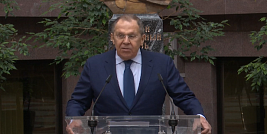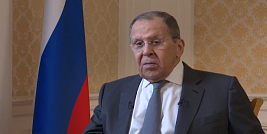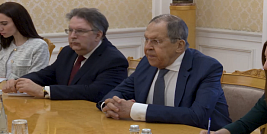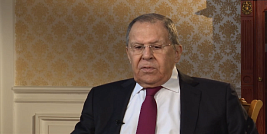Briefing by Foreign Ministry Spokesman Alexander Lukashevich, 25 December 2014
Our fundamental position with regard to Kiev's course toward Ukraine's NATO membership is well known. The alliance's further advance to the east will imminently lead to a serious military and political shift in Europe and the world, affect Russia's national security interests and compel our country to retaliate appropriately.
The impression is that the Ukrainian authorities today regard rapprochement with NATO as an alternative to the development of normal relations with Russia. This can further worsen Russian-Ukrainian bilateral ties and impede the resolution of important issues pertaining to collaboration in various fields, including the economy and the energy sector.
It is perplexing that the Verkhovna Rada's decision, initiated by Ukrainian President Petr Poroshenko, was made at a time when certain positive trends have emerged in the peace process in southeastern Ukraine.
We firmly believe that the Euro-Atlantic shift in Ukraine's foreign and domestic policy is unlikely to help the country overcome its deep political, economic and social crisis.
It is also obvious that the Ukrainian leadership's NATO ambitions will further impede the Ukrainian state in tackling the major challenge it is facing: a search for national accord.
Russia believes in establishing an atmosphere of trust between countries and is against the creation of new lines of tension in Europe. The nature of current security risks and threats calls for different, non-confrontational formulas in interstate interaction.
In their numerous comments and remarks, politicians both in Ukraine and NATO [countries] have referred to a state's right to choose the methods and forms of ensuring its own security. No one can argue with that, but everyone seems to have forgotten the principle approved in various OSCE and Russia-NATO Council documents, namely that in choosing the forms of ensuring national security it is essential to take into account the threats this can create for other states. This is a very important aspect, since it reflects the concept of general, comprehensive and undiminished security, a principal component of which is that national security must not be ensured at the expense of the security of others.
We are increasingly alarmed over the mounting trend towards the consolidation of the positions of the terrorist groups, primarily the Islamic State (ISIS). The actions of the so-called US-led anti-terrorist coalition that are taken without the sanctions of the UN Security Council or the consent of the legal authorities of the Syrian Arab Republic are failing to produce any tangible effect.
True, some media are trying to credit the coalition with a serious success by reporting that as a result of its bombing-missile attacks ISIS has lost 1,175 commandos. We will not undertake to judge the authenticity of this information. At the same time it is obvious that by ignoring the required coordination with official Damascus the Americans and their coalition partners will not be able to turn the tide of the confrontation with the Islamic radicals in their favour.
The terrorists have learned to minimize the losses from the coalition's air attacks. The main point is that due to their effective ideological efforts they have no problem replenishing their ranks. Every killed commando is replaced with a new jihadist. The ISIS army is gaining strength and attracting scattered groups from "modest opposition". Brigades of Liwa Shuhada Yarmouk, Bayt al-Maqdis and Katiba Abu Mohamed at-Talawi have recently sworn an oath of allegiance to the Caliphate in the Deraa Province.
The growing military-technical potential of the ISIS army is a source of serious concern. There are reports that the jihadists downed a Jordanian Air Force plane that participated in the anti-terrorist operation using a surface-to-air missile near Al-Rakka and seized its pilot.
In this context we reaffirm our consistent position in support of the resolute struggle of the Syrian Government against the terrorists of ISIS, al-Nusra, al-Qaeda and the like. At the same time we emphasise that the domestic armed conflict in Syria does not have a military solution. It can only be settled through political and diplomatic means through inclusive inter-Syrian dialogue based on the Geneva Communique of 30 June 2012 without any preconditions or outside interference. We are intensively working with the Syrian authorities and opposition representatives to stop the bloodshed as soon as possible and alleviate the sorrows and sufferings of the Syrian people.
In Moscow in late January 2015, we are planning to host consultations and preparatory contact between representatives of the constructive opposition and the Syrian Government. Russia's Special Presidential Envoy for the Middle East and the African Countries, Deputy Foreign Minister Mikhail Bogdanov told the Interfax news agency that such an event is very likely to take place in January.
We would like to emphasise that this Russian idea does not replace the internationally recognised foundation for Syrian settlement – the Geneva Communique of 30 June 2012 that is confirmed by UN Security Council Resolution and aimed at supplementing the efforts of Special Envoy of the Secretary-General for Syria Staffan de Mistura. Mistura and his team are working on the idea of "freezing zones" in the conflict, starting with Aleppo, where scattered armed secular opposition units still retain influence after exhausting hostilities with the radicals. We hope that these efforts will make it possible to reduce violence, avoid thousands of new victims and return this largest Syrian city to normal life while preserving the independence, sovereignty and territorial integrity of Syria.
The Syria Humanitarian Response Plan 2015 is comprised of two basic elements: a Strategic Response Plan designed to provide humanitarian aid to 12 million Syrians residing on the territories controlled by the government and the opposition, and a Regional Refugee Plan for the refugees whose number has already exceeded 3 million and continues to grow. The plan was presented in Berlin on 18 December under the auspices of the United Nations and with the participation of representatives of UN and international humanitarian agencies, several donor countries and NGOs.
Importantly, the plan was approved by the Syrian government. We are convinced that in order to maximise the effectiveness of international humanitarian efforts in Syria, it's imperative to maintain close coordination with the Syrian authorities in the future.
The total amount of requested funding needed for the implementation of these instruments amounts to $8.4 billion. We hope that donor funding will be provided in full. We believe that proper reserves for this are in place. In particular, instead of allocating funds to the rebels, the sponsors of such activities could redirect those investments in the right direction and make them available to the citizens of Syria as humanitarian aid.
For its part, Russia will continue to provide regular humanitarian aid to Syria through bilateral channels and international humanitarian organisations.
We fully share the unanimous assessment of the situation made in Berlin, including from Under-Secretary-General for Humanitarian Affairs Valerie Amos, UN High Commissioner for Refugees Antonio Guterres, and others that the Syrian crisis can be resolved only by political means.
We are convinced that the humanitarian situation in the country can only be turned around through a sustainable political and diplomatic settlement, consolidated opposition to terrorist threats, and the cessation of armed confrontation and violence. We will continue to contribute to this goal.
Russia has begun to study the third report of the Organisation for the Prohibition of Chemical Weapons (OPCW) in order to establish the facts of the possible use of chlorine-containing substances in Syria as a chemical weapon. The report was distributed to OPCW members on 19 December. The facts and assessments included in it call for a comprehensive and thorough analysis by professionals. This document will be reviewed by the OPCW Executive Council on 21 January 2015.
We welcome the willingness to review and evaluate the report recently transferred by Damascus to the OPCW on the possible involvement of the Islamic State and other terrorist groups on the use of chlorine in Syria, including for purposes of provocation that was expressed by the OPCW Technical Secretariat's Director General.
On 17 December, the Jordanian delegation distributed to the UN Security Council, at the request of the Palestinian side, a draft resolution on a Middle East settlement. Consultations on the draft resolution continue. As we have repeatedly stated, Russia is in favour of the Security Council adopting a resolution which will facilitate the resumption of negotiations between Israel and Palestine and help resolve the existing issues. The Russian Foreign Minister's Special Envoy to the Middle East and Director of the Middle East and North Africa Department at the Russian Foreign Ministry, Sergey Vershinin, went to that region for bilateral consultations on the Middle East.
Question: Can you give the approximate dates of a meeting in Moscow between the Syrian opposition and the Syrian government? Have the representatives of the opposition groups been issued invitations? Is there a response from them?
Answer: Today, I can't provide you with any details. I can only say that we expect to hold such a meeting after 20 January.
As for sending out invitations, I reiterate that we plan to hold an informal meeting that doesn't involve sending out official invitations. In preparation for this meeting, Foreign Minister Sergey Lavrov, Presidential Special Representative for the Middle East and African Countries and Deputy Foreign Minister Mikhail Bogdanov, and the Foreign Minister's Special Envoy to the Middle East and Director of the Middle East and North Africa Department at the Russian Foreign Ministry Sergey Vershinin have worked with various opposition members.
We hope that the Syrian opposition representatives will include not just members from the internal and external opposition, but those who can generate constructive ideas about launching an inter-Syrian dialogue and achieving a political settlement, rather than putting forward unacceptable demands for a regime change. It will be quite a small group of people, who will be provided a venue in Moscow to start consultations with each other and develop constructive ideas and positions. After that, we plan to invite representatives of the Syrian government, and the sides will informally try to outline their respective visions of the situation and ways to reach a settlement in order to formalise the dialogue with due account taken of the initiatives of UN Secretary-General's Special Envoy for Syria Staffan de Mistura and his contribution to these efforts. That's the plan. We hope that we will be able to hold such meetings in late January 2015.
Question: Will Special Envoy of the UN Secretary-General for Syria, Staffan de Mistura, be invited to the meeting in Moscow?
Answer: It is hard to say now whether Staffan de Mistura will take part in the meeting as its details and format are to be worked out taking into account the opinions of all the sides of the conflict. I do not exclude that possibility although the concept of the Moscow meeting, probably, first presupposes exchanging opinions and launching a dialogue between the conflicting sides. Staffan de Mistura has a far-reaching mandate. The Moscow meeting is planned to take place in stages: first the opposition will try to elaborate its own consolidated ideas, and after that, Syrian Government officials will join in the dialogue in an informal setting and will try to find common ground for launching a wider and more formalised dialogue between the conflicting parties in Syria.
Question: Will you please release the names of the opposition representatives who will participate in the meeting. Does the SAR Government's joining in the negotiations depend on specific decisions by the opposition?
Answer: I am not prepared to name the persons. There are a number of well-known activists from the internal and external opposition whose names are buzzwords. It is premature to name them as it will have to take into consideration the reaction of the opposition activists.
As to Syrian Government officials joining in the negotiations, their participation will undoubtedly depend to a significant degree on the stance worked out by the opposition representatives in an informal setting. Nevertheless, the latest contacts of the Russian President's Special Representative for the MiddleEast and African Countries and Deputy Foreign Minister Mikhail Bogdanov, including contacts with the president of the Syrian Arab Republic, Bashar Assad, reveal that the Syrian leadership has a constructive attitude towards the implementation of our idea.
A dialogue of this kind is always complicated. Suffice it to recall uneasy discussions in Montreux, the way things were unfolding at the next stage of the implementation of the Geneva Communiquй. The key challenge of the Moscow meeting consists of making the sides agree on the implementation of the basic document which was solidified by the sides in Geneva with international support on 30 June 2012.
Question: Which opposition groups will not be present?
Answer: Let me reiterate, we will have matters clarified regarding the persons and the format closer to the appointed date in January.
Question: What level of Syrian Government representatives are to be invited? The media do not exclude the possibility for President Bashar Assad's presence. Is that possible?
Answer: It's hard to exclude something in our lives. But in this particular case, the level of the country's president does not conform to the format of a consultative meeting. There are negotiators appointed – the Syrian Foreign Minister, First Deputy Foreign Minister of the Syrian Arab Republic, and others. The level of the delegation to participate in the Moscow consultative meeting will be determined by the Syrian authorities.
Question: On 24 December, the International Arms Trade Treaty came into effect. Will the provisions of the document apply to the US, who declares its intentions to arm the "peaceful" opposition in Syria?
Answer: You are familiar with our stance. We have certain restraining elements regarding this document as it does not clearly state a ban on arms supplies to non-government subjects and associations. It is a very important component which, unfortunately, failed to be reflected in the document.
We will start from the fact that the Treaty is a significant result of long multi-lateral negotiations. It should be strictly observed, especially with regard to a ban on arms proliferation for conflict areas. In 1993, the OSCE adopted an important document on the principles regulating the transfer of conventional weapons, which prohibits deliveries of weapons to conflict areas. I hope that the Arms Trade Treaty and the agreements reached at the regional level will not allow for feeding conflict regions with additional weapons. This is very dangerous from the point of view of regional and international stability.
Question: The media has little information on yesterday's meeting in Minsk. Could you report on what the parties managed to agree on? Why did the representatives of the Donetsk People's Republic call the talks tense?
Answer: It was clear from the outset that the 24 December negotiations in Minsk were going to be tense. I can't really report any additional details today. The key is that the dialogue goes on, there are reasons to believe that it may resume soon. The framework agreements reached last September, including the Minsk Protocol and the Minsk Memorandum, require specific, practical steps on the implementation of the provisions stated in them. It primarily concerns the final and guaranteed cessation of all military activities, withdrawal of arms to a respective distance, exchange of prisoners of war, and a number of other conditions that need to be completed by the conflicting sides.
An important component that I can make public at this point (since we do not have the complete picture of the negotiation results), is a proposal by the Donetsk and Lugansk People's Republics to consider a package of complicated economic issues connected with the status of the region (which is actually stated in the Minsk Protocol), and the programmes of restoring the Donbas economy and infrastructure, which the parties agreed to in September. We can only assume that the complexity of the problems did not allow the parties to solve all the practical issues within one day. We expect that the dialogue will be continued in the coming days. The parties did not just leave, they have taken a break to finalise their positions.
The negotiations between these conflicting sides are a delicate international balance that makes wide media coverage difficult. The positions of the parties differ, but there is a desire from each to keep the September agreements, which unfortunately have not been implemented in full.
Question: Can you comment on the controversy around the release of the film The Interview in the US and some other countries, where the story shows the assassination of the leader of the DPRK, Kim Jong Un? What is the position of the Russian Foreign Ministry regarding the fact that US authorities welcomed the release of the film? Are there fears in Moscow that the screening of the film in Russia could harm our relations with Pyongyang?
Answer: The very idea of the film is so aggressive and scandalous that the reaction of the North Korean side (and not only them) is quite understandable.
Russia is concerned with yet another stage in escalating tensions between the United States and the DPRK due to accusations of Pyongyang of being complicit in the cyber attack on the Sony Picture web site. The US never presented any direct evidence of these acts by Pyongyang. Moreover, let me remind you that Pyongyang suggested conducting a joint investigation of the incident which would open up additional opportunities for easing the tension. In fact, the step is evidence of the North Korean side's sincere striving for investigating the issue in every detail.
Revenge threats and calls to other countries to condemn the DPRK voiced by the US are viewed by us as absolutely counter-productive and dangerous, because they just contribute to the situation on the Korean Peninsula which is complicated enough, and can lead to the further escalation of the conflict. This runs absolutely contrary to everybody's interests, especially to the interests of regional security.
In connection with such attention from the US Administration to the problems of electronic network protection, it is regrettable that it was the US initiative to disband the structure of the Russian-US presidential Commission staffed with specialised groups of professionals and experts, including experts in threats to information and communication technologies. We have always presumed that that channel for professional communication could have helped in working out a consolidated point of view. Let me remind you that our attempt on the issues of international security in information and communication technologies in partnership and collaboration with our American colleagues has been successfully implemented within the OSCE.
Question: How would you comment on yesterday's sudden electricity outages in Crimea?
Answer: This situation requires recovery measures rather than a verbal reaction, and recovery was performed yesterday with the help of the Russian agencies. We expect that in such situations that the Kiev authorities will be guided by the people's needs and will think about ordinary citizens suffering from serious problems.
As to our help, it is being rendered and will be rendered to that part of our country. There should be no doubts that interruptions in electric power supplies from Ukraine will be completely compensated with Russian assistance.
May I take this opportunity, to wish you a Happy New Year and Merry Christmas. I wish everyone all the best, health, peace and happiness! We are waiting for you with new ideas in the Russian Ministry of Foreign Affairs in 2015.



















